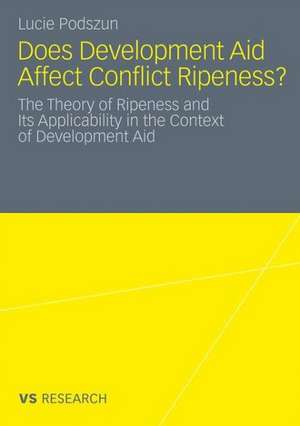Does Development Aid Affect Conflict Ripeness?: The Theory of Ripeness and Its Applicability in the Context of Development Aid
Autor Lucie Podszunen Limba Engleză Paperback – 8 sep 2011
Preț: 388.13 lei
Nou
Puncte Express: 582
Preț estimativ în valută:
74.27€ • 77.74$ • 61.82£
74.27€ • 77.74$ • 61.82£
Carte tipărită la comandă
Livrare economică 01-15 aprilie
Preluare comenzi: 021 569.72.76
Specificații
ISBN-13: 9783531183787
ISBN-10: 3531183788
Pagini: 340
Ilustrații: 338 p. 22 illus.
Dimensiuni: 148 x 210 x 20 mm
Greutate: 0.42 kg
Ediția:2011
Editura: VS Verlag für Sozialwissenschaften
Colecția VS Verlag für Sozialwissenschaften
Locul publicării:Wiesbaden, Germany
ISBN-10: 3531183788
Pagini: 340
Ilustrații: 338 p. 22 illus.
Dimensiuni: 148 x 210 x 20 mm
Greutate: 0.42 kg
Ediția:2011
Editura: VS Verlag für Sozialwissenschaften
Colecția VS Verlag für Sozialwissenschaften
Locul publicării:Wiesbaden, Germany
Public țintă
ResearchNotă biografică
Lucie Podszun’s main academic interest lies within the area of conflict management; specifically the effect of development aid on countries at war.
Textul de pe ultima copertă
Many developing countries find themselves in seemingly intractable internal conflicts, hindering them from moving on into a more stable, secure and wealthy environment. It seems that underdevelopment and conflict go hand in hand. Underdevelopment most often implies large streams of development aid channeled into countries at war. The work evaluates to what extent an increase in development aid affects conflict ripeness. The research shows that the effect is ambivalent: it depends on the conditions of provision whether it is positive or negative. In general, an ‘increase in development aid’ decreases the intensity of one of the ingredients to conflict ripeness: the mutually hurting stalemate. However, if embedded into a smart strategy, an ‘increase in development aid’ enhances the second ingredient to conflict ripeness: the sense of a way out. By that it counterbalances the negative effect and thus fosters the phase of ripeness, creating an ideal starting position for a subsequent peace process.
Caracteristici
The Theory of Ripeness and its Applicability in the Context of Development Aid







